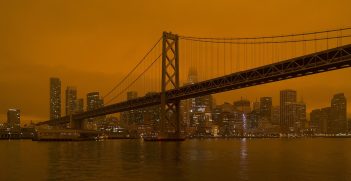Climate Change and the Challenges of New Energy Technologies

The expansion of neoliberal capitalism across the planet has been largely responsible for climate change, a phenomenon that is changing weather patterns. As a result of climate change, the planet’s ability to adapt is increasingly being stifled, and people around the world are becoming progressively vulnerable to natural calamities like devasting storms, droughts, wildfires and floods.
Carbon emissions from fossil fuel consumption, methane gas from dairy farms, and deforestation are all playing a role in contributing to rising temperatures and a thinning of the ozone layer. In pursuit of economic growth, industrialised countries are exploiting the use of coal, natural gas, exacerbating the levels of carbon dioxide, which have grown considerably. As well as contributing to a rise in global temperature, carbon dioxide also depletes the protective ozone layer above the planet.
Since the beginning of industrialisation, the planet’s average temperature has risen outside of natural cycles. The weather has been extremely hazardous, with record-breaking high temperatures, flash floods (as in Bangladesh’s Chattagram and India’s New Delhi witnessed this year), record-setting storm surges (as Libya’s flood caused by the storm Daniel killed over 10,000 people), and exceptionally high sea levels (Bangladesh has seen 3.8-5.8 mm rise of sea level in coastal area in past 30 years). As a direct consequence of this, human lives and livelihoods will continue to be affected.
To tackle climate change and guaranteeing climate justice for the most vulnerable groups, global leaders designed a strategy termed the “Global Green New Deal (GGND)” to improve well-being and health of citizens future generations. The Paris Agreement on climate Change was adopted at COP21 in 2015 and agreed upon to keep global temperature below 1.5 degree Celsius by emitting less carbon and provide vulnerable countries with $100 billion fund.
However, corporations are embracing a new hegemonic market apparatus that will rule over the GGND: clean energy and electronic vehicles (EVs) that will replace petroleum-based businesses and vehicles.
The gathering of the raw materials for renewable energy is as crucial as investment in renewable energy. While the search for renewable energy’s basic materials produces new employment possibilities, it sparks new environmental issues like air and water pollution, land degradation and potential for groundwater contaminations. The global superpowers and companies are now competing for a new economic war focusing on the extraction of raw materials for clean energy and Electric Vehicles (EV).
Minerals including lithium, nickel, cobalt, copper, and graphite are used to make rechargeable batteries for EVs, which are crucial for underpinning an extensive number of companies and increasing demand for EVs in coming decades. These minerals are essential for the creation of electric batteries, since they store energy and are used to power generation. However, the mining of these renewable energy sources result in significant damage to the natural ecosystem.
Let’s take lithium as an example. As the most well-known mineral for powering electric vehicles, extracting lithium results in complications including soil degradation, water scarcity, loss of biodiversity, disruption of ecosystems, and a rise in global warming. In some places, including northern Chile’s Toconao, Portugal’s Pinhel, and Zimbabwe’s Madzima, the mining of lithium has sparked disputes over extraction. The Rivalry between Chinese and Western mining companies seeking control of lithium mines in African countries like Namibia, Zambia, Mali is a potential new source of conflict between these countries.
Solar power and wind energy are becoming more popular as potential replacements for fossil fuels. They are a low-cost, environmentally friendly option for producing electricity. However, solar power production is not always feasible in all locations (over populated countries like Bangladesh, Hong Kong, for instance). To produce the solar panels anticipated for such a massive rise in renewable energy output, an increase in the mining of raw materials is required. The extraction processes for the silicon, silver, aluminum, and copper required for the production of solar panels are fought with inadequacies due to a plethora of extraction challenges. Meanwhile, there is a speculation that China uses forced labour in its western Xinxiang province to produce solar panels and polysilicon extraction, violating the human rights of Uyghur people.
Climate change threatens some countries more than others. Some countries are suffering to feed their people, while technological shortages, few experts, or an inability to improve infrastructural development is hindering survivability in that face emerging climate catastrophes. As an example, Bangladesh is ranked as seventh position among the most vulnerable countries with an estimated loss US$3.72 billion over the past two years due to climate change. According to the Loss and Damage Collaboration, a climate advocacy organisation, the cost of climate change-related financial losses in the 55 most vulnerable countries between 2000 and 2020 is expected to exceed US$50 trillion. In the following ten years, this deficit will balloon by another fifty thousand crores of US dollar. Several climate vulnerable countries are already impoverished, regular borrowing money from rich countries in order to mitigate natural disasters. As a result, they run the danger of falling into a debt trap, which threatens their economy and security indefinitely.
Environmental conflict is flourishing as a result of efforts to implement the global green new deal. In light of this, governments and international organisations need to develop policies that prioritise the needs of their citizens. Every country must have the opportunity for full and decent work at affordable wages, and this can only be accomplished with a globally productive economy and a positive-sum strategy. We also need a sustainable future based on the mobilisation of resources and policies to decarbonise development and restore environmental health in all aspects of the GGND.
Sauid Ahmed Khan is a freelance writer & Graduate of Department of Peace and Conflict Studies, University of Dhaka.
This article is published under a Creative Commons License and may be republished with attribution.





